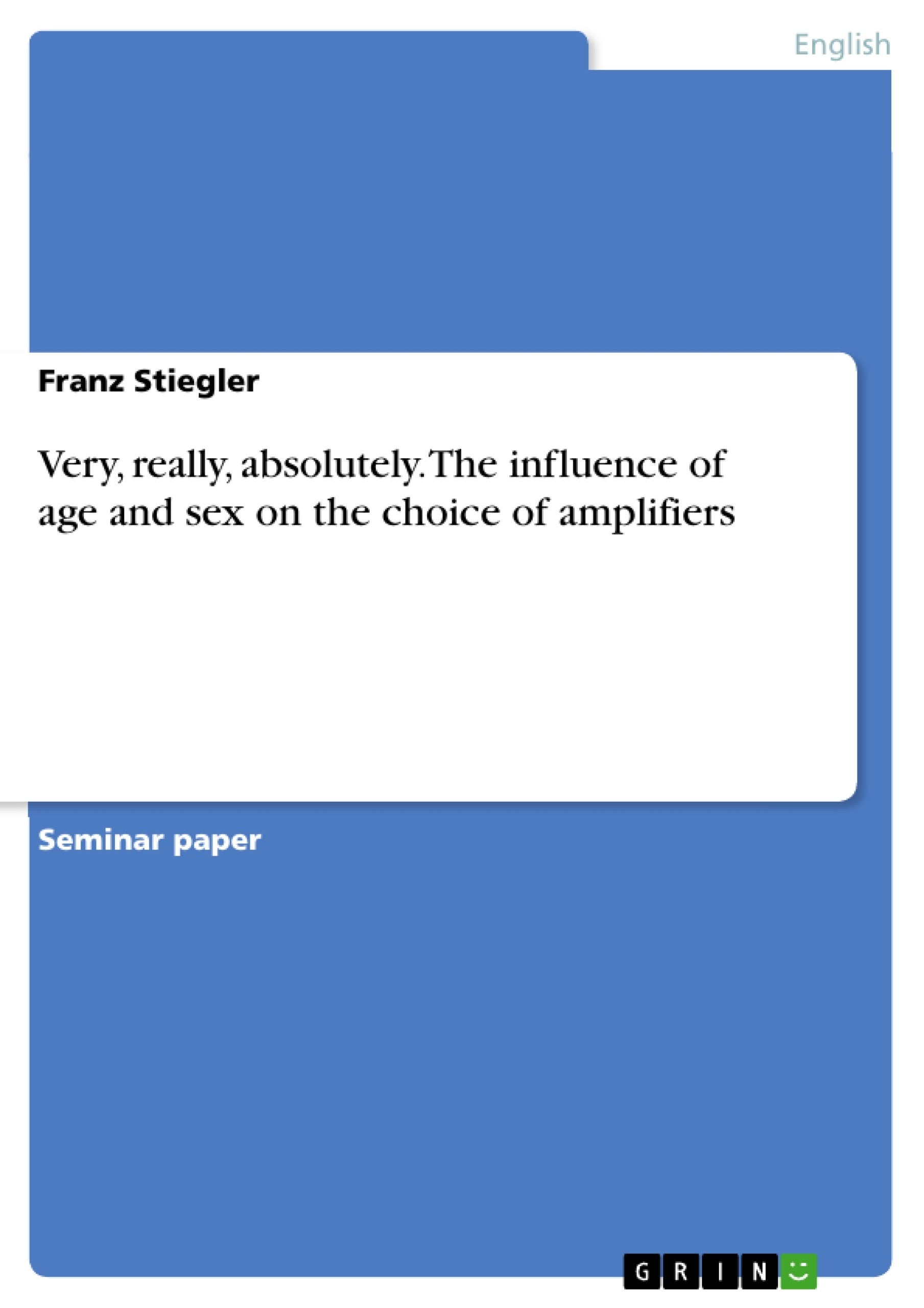The differences of daily spoken language could be explained by an internally motivated diasystem that explains language differences due to the speaker’s geographical, social, and situational context of communication. Obviously, there are several more triggers that lead to a different choice of words, such as the speaker’s sex or age.
This paper focuses on both of the last aspects, the sex and age, with regard to the choice of amplifiers, which fall into the semantic category of degree. “Amplifiers scale [gradable units] upwards from an assumed norm”, such as a fast car in comparison to a very fast car. Their aim is thus to either enlarge their referring item in space or capacity, or to augment the same in volume or amount. Whilst doing so, they “indicate […] a point on an abstractly conceived intensity scale; and the point indicated may be relatively low or relatively high”.
Whereas many parts of daily language are not really interchangeable (e.g. lexical items), amplifiers are an exception, as their sense in language is to increase the referring unit. At the same time there are many other possibilities, other amplifiers, that have the same effect. Thus, this leaves room for speakers to individualize their speech, which makes it highly interesting and valuable for social studies at the same time. Those individualizations can be categorized regarding the speaker’s age or sex and then evolve to gender or generation discussions.
As a consequence, the question whether a so-called ‘women’s language’ exists became one of the focuses of socio-linguistic studies and is to a high degree yet to be answered. Although this possible women’s language might also exist in texts, it is much more likely to appear in spoken conversations – same accounts for the age.
Thus, in this paper, I am going to analyze the choice of amplifiers in spoken British English by men and women in different ages, which will help to better understand how far the choice of words is determined by the speaker’s age and sex.
Inhaltsverzeichnis (Table of Contents)
- Introduction
- Background
- Classification of amplifiers
- Sex
- Age
- Methods and data
- Results
- Conclusion
Zielsetzung und Themenschwerpunkte (Objectives and Key Themes)
The aim of this paper is to examine the influence of sex and age on the choice of amplifiers in spoken British English. The paper explores how speakers use amplifiers to intensify their expressions and to convey different degrees of intensity.
- The classification and categorization of amplifiers, distinguishing between maximizers and boosters.
- The analysis of the colocation patterns of amplifiers and how they can be used to convey specific meanings.
- The potential influence of sex on the choice of amplifiers, considering the existence of a "women's language" and related sociolinguistic theories.
- The potential influence of age on the choice of amplifiers, exploring how generational differences might manifest in language use.
- The investigation of how the choice of amplifiers can be influenced by the speaker's social and situational context.
Zusammenfassung der Kapitel (Chapter Summaries)
- Introduction: This chapter introduces the concept of amplifiers as a linguistic category and explains their role in intensifying expressions. It also raises the question of whether there are differences in amplifier usage based on sex and age.
- Background: This chapter delves deeper into the classification of amplifiers, distinguishing between maximizers and boosters. It also explores previous research on sex differences in language, specifically related to the potential existence of a "women's language."
- Methods and data: This chapter will likely describe the research methodology employed in the study. It will explain the data collection process, the specific dataset used, and the analytical framework applied to analyze the data.
- Results: This chapter will present the findings of the study, providing an analysis of the data collected and highlighting any significant patterns observed in the choice of amplifiers across different sex and age groups.
Schlüsselwörter (Keywords)
The main keywords and focus topics of this work are: amplifiers, maximizers, boosters, colocation, sex differences, language variation, age variation, spoken British English, sociolinguistics.
- Quote paper
- Franz Stiegler (Author), 2018, Very, really, absolutely. The influence of age and sex on the choice of amplifiers, Munich, GRIN Verlag, https://www.grin.com/document/427560



